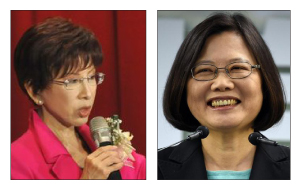
Hung Hsiu-chu (left) and Tsai Ing-wen
By Ralph Jennings
Associated Press
TAIPEI, Taiwan (AP) — Taiwan’s top two political parties have each nominated a woman for president in 2016, a historic first signaling acceptance of female leadership and kicking off a campaign highlighted so far by clashing views on ties with rival China.
The ruling Nationalist Party on Sunday picked as its candidate Hung Hsiu-chu, a former teacher and the current deputy legislative speaker. Hung, who supports friendly relations with China, will run against Tsai Ing-wen, the opposition Democratic Progressive Party chairwoman and an advocate of more cautious relations with Beijing.
Tsai leads in opinion polls ahead of January’s election.
Ties with Beijing, long icy but cordial since 2008, have shaped up as an early campaign issue.
Voters in Taiwan, which has been democratic since the late 1980s, have never elected a woman as president nor had a choice between two female candidates backed by the major parties.
Joanna Lei, chief executive officer of the Chunghua 21st Century Think Tank in Taiwan, said that some younger women struggle to advance in Taiwan. However, she said society accepts the leadership of women over age 50 because they historically ran clans in China, where Taiwan’s culture originates.
Women manage 10 government departments and some of Taiwan’s top companies. One third of Taiwanese legislators are female, compared to 13 percent in Japan and 16 percent in South Korea, said Sean King, senior vice president with Park Strategies, a New York-based consultancy firm.
Elsewhere in Asia, Park Geun-hye took office two years ago as South Korea’s first female president, and Sheikh Hasina is currently the prime minister of Bangladesh. Women have also been elected to the highest office over the years in the Philippines, Thailand, Indonesia and India.
China claims sovereignty over self-ruled Taiwan, where Chiang Kai-shek’s Nationalists based their government in the 1940s after losing the Chinese civil war to the Communists. China insists that the two sides should eventually reunite, though opinion polls on the island say most Taiwanese prefer autonomy.
Elected in 2008, President Ma Ying-jeou set aside the political dispute to start dialogue with Beijing and sign economic agreements. He agreed with Beijing to negotiate on the basis that both sides belong to one China, though with different interpretations.
Hung supports a similar understanding with China, but Tsai’s party rejects that basis for talks as a slight to Taiwan’s autonomy. Without a framework for dialogue, tensions could rise again, making new agreements difficult.
Hung’s Nationalists lost nine mayoral and county magistrate seats in November, with younger voters accusing Ma’s government of getting dangerously close to China while ignoring a wealth gap at home. Ma must step down in May due to term limits.
Tsai, a 58-year-old lawyer by training and once Taiwan’s top policymaker on mainland China affairs, lost the 2012 presidential race to Ma by six percentage points.
Hung, 67, has been dubbed a “little chili pepper” for her biting, humorous style of grilling government officials in parliament.
“The usual way to win, of course, is to try to capture the pivotal political middle,” said Denny Roy, senior fellow at the East-West Center think tank in Honolulu. “In this respect, Hung is an unexpected, even odd, choice for nominee. What seems to be most clear is that Taiwan’s voters are ready for a female president.”
The Nationalist Party’s best-known figures, including the chairman, did not enter their names as potential nominees. Analysts say those would-be candidates are waiting until the 2020 race, when they stand better odds of winning. (end)



